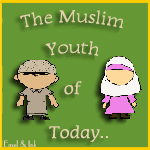This is a post I have been thinking about writing for quite some time because I have a lot of thoughts on this issue (the reasons why may be obvious from the rest of this post) and I wanted to get them down and get some feedback from other Muslims. Here is how I want to focus this topic:
1. Before Marriage – Stereotypes/Obstacles
2. During Marriage – Culture Clash, Confused Kids, and Bewildered in-Laws
3. Societal Ramifications (focus on living in the US)
4. Parting Comments
Before Marriage – Stereotypes and Obstacles
No matter your background, an interracial marriage will be met with obstacles on both sides. It is especially the case for the generation of people whose parents were immigrants, and they themselves were raised here. To even broach the idea of an interracial marriage will spring forth 100 year old stereotypes of other cultures you never even knew existed. It is particularly sad when these are directed at other Muslim groups. For example, a Pakistani trying to marry an Arab will no doubt hear many “Arabs are this…” or “Arabs are that…” type of comments.
Even those who marry within the race will often face problems in marrying outside the tribe, or people from a specific part of the same country, so much so that some people even consider these marriages to be against the norm.
Muslims who are the first generation to be born and raised in the West face a unique dilemma. They must harmonize between finding someone who is suitable religiously, and culturally. The cultural aspect can get confusing because while a person may be Indian, they have more in common with a Bengali person who grew up here also as opposed to an Indian person from ‘back home.’
It is that point though, that parents have a tough time coming to grips with. It seems some have missed the fact that their kids have a distinct culture that’s different then what they think they taught them. This is why it is frustrating to see many marriages being held up because someone’s parents are looking from a family who is from the same village back home.
It is good to see the trend of our youth overlooking the racial/ethnic lines in marriage, and trying to marry for the deen, however, the obstacles are often great. Many families are not accepting of such marriages, and many face great difficulties in pursuing them. The hardest part is breaking stereotypes that people have formed, or been brought up with. These are literally ideologies they may have held for the vast majority of their lives. The culture and environment their kids have been brought up in though, does not hold fast to these same ideals.
During Marriage
This is where the toughest adjustment comes, and the cultural differences must be overcome. For purposes of this article, we will go ahead and assume that alhamdulillah as far as the deen is concerned, both parties are mashallah practicing and on the same page in regards to their religion. It is what comes outside of that which can cause problems.
The first problem is, if I may term it so, latent cultural tendencies. By this I mean that once a person is married, they are now in a stage of life that they have not experienced before (assuming it’s the first marriage). Since this is the case, the only ‘experience’ they have to revert back to is that of their own parents. A person might not realize these things before marriage, but after a kid, the husband may start acting a certain way, and due to the way he was brought up, he will have certain expectations as to what his wife should do as a mother. The wife, having been brought up differently, may have the opposite expectation. This is a situation where the culture has caused a clash despite the fact that neither one may actually be a cultural Pakistani, or a cultural Arab in the traditional sense.
In-laws are another issue that comes up. Different cultures have vastly different expectations of their sons-in-law or daughters-in-law, and an interracial marriage will bring about an abrupt adjustment period for them. Language barriers can also be an issue here. It is unfortunate that this aspect of an interracial marriage is often the most overlooked despite the heavy emphasis in Islam on preserving the family ties. Deen may very well be an extremely strong bond in preserving your marriage, but does that same bond exist with your spouse’s parents, uncles, aunts, brothers, sisters, nieces, nephews, and other family members?
Kids add another dimension, and quite possibly the toughest. The husband/wife must be prepared to deal with difficulties their children may endure from being of mixed-race. There’s also issues of what languages to teach them, and how to communicate in the house. It is important for these issues to be agreed upon before getting married. Everyone has seen families where the mother and children communicate in one tongue, and the father is often left out in the cold and ends up disconnected from the family.
Societal Ramifications
Obviously interracial marriages are not for everyone, not everyone desires one (most probably don’t), and not everyone is cut out for one. With that said, it is encouraging to see a rising trend in these marriages. We are after all, one ummah. Our cultures do enrich our ummah, but they cannot come before our religion. To see more couples and mixed-race children is a very apparent way of breaking down some barriers and stereotypes that exist within our societies. It exposes Muslims of one culture more intimately to those from another, and in the end I feel it increases the bonds of brotherhood and sisterhood.
It is also important in our times, to not let ourselves become segregated too much; otherwise we will end up with masjids separated out like the “black churches” or “white churches.” I know that exists to some degree now, but alhamdulillah I think most of the bigger masaajid in bigger communities are very diverse (even if the board members might all be from one country, but that’s a different story).
Tariq Nelson made a pertinent point on his blog; “I am of the controversial opinion that increased interracial/intercultural marriage is one of the ways that will lead to a meshing of a singular American Muslim identity. This would eventually lead to more of a blending in this country, culturally and genetically, of the many Muslim cultures as well as the American one. Intermarriage is one of the ways people that were once even somewhat hostile can become one group.”
The most important role interracial marriages may play in this is the affect that they will have on their family and friends. At the very least it will force them to look past their cultural identity and see a first-hand example of a family that is insha’Allah putting their religion above all else – about making themselves Muslim before being anything else.
Parting Comments
First and foremost we should ask Allah (S.W.T) to purify our intentions and grant us the tawfeeq to make all of our actions for Him and for Him alone. Marriage in general is not a goal in and of itself, but it is a means of worshipping Allah by trying to establish a family upon the Sunnah.
If someone chooses to pursue an interracial marriage, they really need to “check yourself before you wreck yourself” and make sure they are ready to deal with the consequences of their decisions. I have outlined just a small sampling of the obstacles that one might face. People really need to do some self-introspection and see where they stand, see what their maturity level is, and know what they can handle before getting involved in anything.
Once a person does become involved in an interracial marriage, the most important thing is to have patience. A lot of things will come your way, but you must persevere through them as a Muslim should. Remember also that all your actions, and your family in the public eye, will be under much more scrutiny than most. One of the saddest things is the attitude people have towards interracial couples of “let’s see how long that will last.” People will be expecting your marriage to fail. It’s not right, but it’s a reality.
Know that it will take time for the families of both parties to integrate and become comfortable with one another. The key is for both people to be willing to put up with that and work towards their ultimate goal of insha’Allah having a good Muslim family. Even outside of family, you will deal with smaller things like trying to fit into social groups that exist in masaajid and communities, or being looked at as the ‘token interracial couple’ of an event, etc.
But insha’Allah if it is successful, there is a huge potential for making dawah and helping to make impact in society. Also, don’t forget the fringe benefit of having super-cute children masha’Allah
These are just some brief thoughts I had on this matter, really I think a whole book can be written on this subject, but I did want to see people’s attitudes towards it. Would you consider it for yourself? What about for your children? What about for your siblings? How do you feel when you see an interracial couple?
Source: http://muslimmatters.org/2007/04/06/thoughts-and-advice-on-interracial-marriages/
Subscribe to:
Post Comments (Atom)





No comments:
Post a Comment